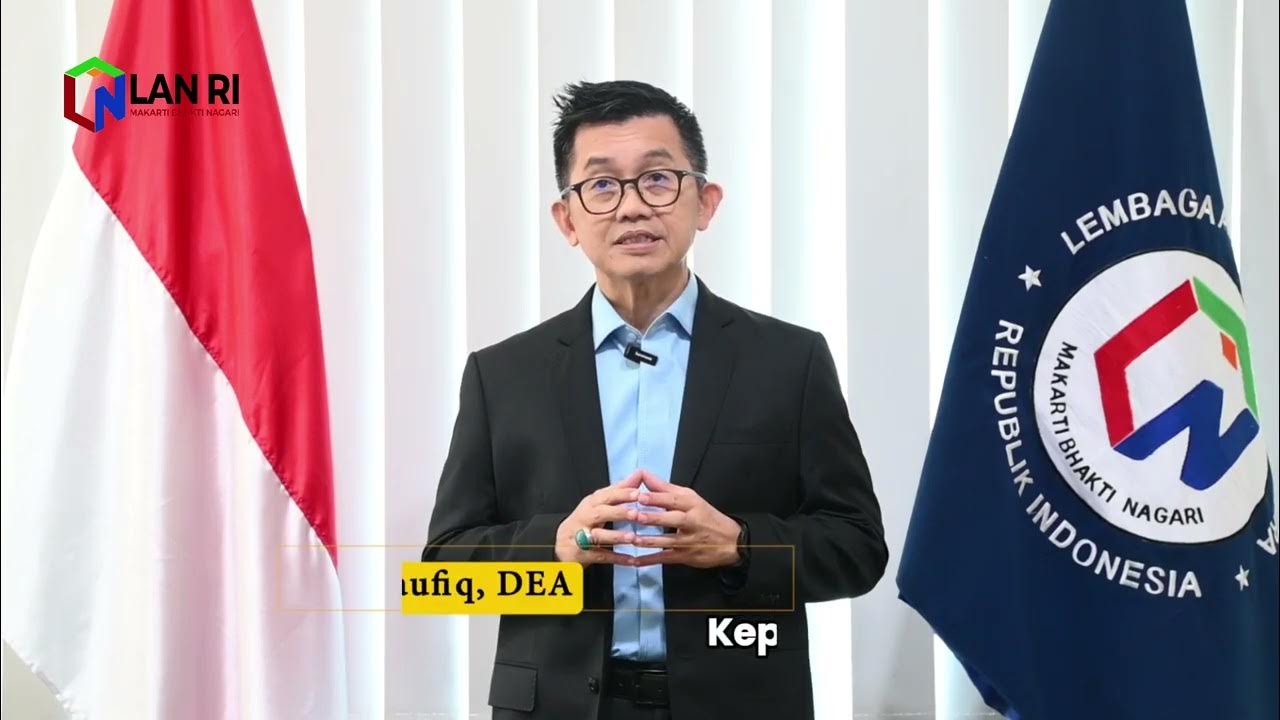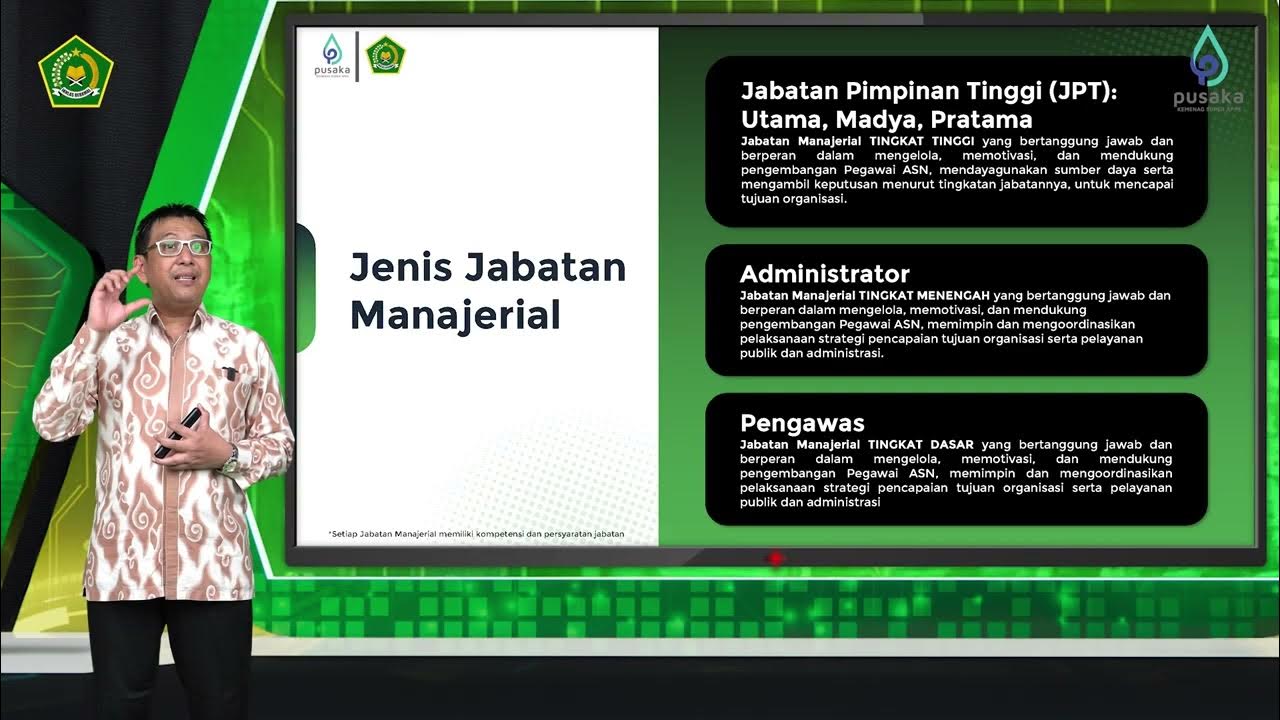RANGKUMAN MATERI SMART ASN DAN MANAJEMEN ASN
Summary
TLDRThis video explains key concepts related to digital literacy and ASN (State Civil Apparatus) management. It highlights the importance of digital literacy, including competencies like using digital media wisely and adhering to ethical standards. The video also discusses ASN roles, emphasizing professional standards free from corruption and political influence. It outlines the rights and obligations of civil servants and government employees, along with a merit-based system for employee development, ensuring fairness, accountability, and career growth. The content aims to promote quality public service and effective governance.
Takeaways
- 😀 Digital literacy is essential for improving public skills and human resources in Indonesia, with a focus on using digital media wisely.
- 😀 Digital literacy involves four competencies: using digital media, understanding digital culture, ensuring digital safety, and maintaining digital ethics.
- 😀 Key issues in digital media include cyberhate, defamation, misinformation, and the violation of privacy in the digital space.
- 😀 ASN (State Civil Apparatus) management aims to produce professional employees who are free from political interference and corruption.
- 😀 ASN management is designed to motivate employees, boost productivity, and align with the goals of the government and society.
- 😀 There are two main types of civil servants: PNS (Permanent Civil Servants) and PPPK (Contract-based Government Employees).
- 😀 ASN serves as an implementer of public policy, a public servant providing quality services, and a unifier of the nation.
- 😀 ASN has rights such as salary, allowances, pension guarantees, and competency development opportunities.
- 😀 ASN has obligations to uphold the Constitution, maintain unity, obey the law, and work with integrity and responsibility.
- 😀 The ASN Code of Ethics emphasizes honesty, discipline, respect, and the execution of duties as per legal regulations.
- 😀 The merit system in ASN management ensures fairness and objectivity, focusing on employee skills, achievements, and career development.
Q & A
What is the main focus of the video?
-The video focuses on explaining the concept of digital literacy, its role in improving public skills, and an introduction to ASN management, as well as providing an overview of CPNS training in Padang City.
What is digital literacy, and why is it important?
-Digital literacy refers to the ability to use digital tools wisely, including not only operating gadgets but also understanding how to use digital media safely and ethically. It is essential for improving human resources' skills in Indonesia and preparing individuals for the demands of the digital age.
What are the four competencies of digital literacy mentioned in the video?
-The four competencies of digital literacy mentioned are: 1) Ability to use digital media or digital scale, 2) Culture of using digital media, 3) Ethical use of digital media, and 4) Safety in using digital media.
What are some of the common issues related to digital media highlighted in the video?
-Some common issues include the inability to understand the limits of freedom of expression, the spread of cyber hate speech, defamation, misinformation, disinformation, and violations of privacy, which contribute to social division and online hostility.
What is ASN, and why is its management important?
-ASN stands for Aparatur Sipil Negara (State Civil Apparatus). Effective ASN management is crucial for ensuring professional public servants who are free from political intervention and corruption, contributing to public policy implementation and the unification of the nation.
What are the two types of ASN mentioned in the video?
-The two types of ASN are: 1) Civil Servants (PNS), who are permanent employees appointed by the government, and 2) Government Employees with Work Agreements (PPPK), who are hired based on a contract for a specific period to fulfill government tasks.
What are some of the rights and obligations of ASN employees?
-ASN employees' rights include salary, allowances, pension guarantees, and competency development. Their obligations include loyalty to the state, maintaining unity, adhering to policies, and executing duties with integrity and responsibility.
What is the ASN code of ethics?
-The ASN code of ethics includes: 1) Carrying out duties honestly, 2) Performing duties with discipline, 3) Serving with respect, politeness, and without pressure, and 4) Following orders from superiors unless they conflict with the law.
What is the merit system in ASN management?
-The merit system in ASN management emphasizes objectivity, ensuring that employee selection and career progression are based on individual abilities and achievements rather than other factors. It supports accountability, fairness, and the alignment of employees' competencies with organizational goals.
What are the benefits of implementing a merit system in ASN management?
-The benefits of a merit system include promoting justice and transparency in career paths, ensuring employees have equal opportunities for career development, and achieving high-quality public service by assigning the right individuals to the right roles.
Outlines

This section is available to paid users only. Please upgrade to access this part.
Upgrade NowMindmap

This section is available to paid users only. Please upgrade to access this part.
Upgrade NowKeywords

This section is available to paid users only. Please upgrade to access this part.
Upgrade NowHighlights

This section is available to paid users only. Please upgrade to access this part.
Upgrade NowTranscripts

This section is available to paid users only. Please upgrade to access this part.
Upgrade NowBrowse More Related Video

TERBARU‼️ RESUME JURNAL MOOC PPPK 2025 || Agenda 1, 2, 3 Versi PDF

[MOOC] Materi 03 - Kebijakan Pelatihan Dasar CPNS

Presiden Prabowo Umumkan Kenaikan Gaji Guru ASN dan Honorer, Disambut Tepuk Tangan Bahagia

Kepala LAN Sambutan Penyelenggaraan Orientasi PPPK

OBROLAN - National Future learning Forum : Dari "Ego Sistem" menjadi Ekosistem

Kabiro SDM Pengenalan Jabatan
5.0 / 5 (0 votes)